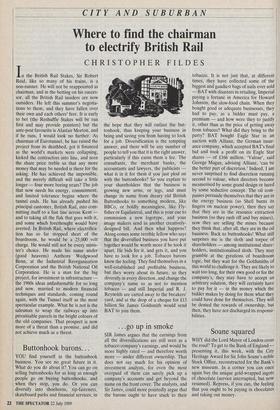Buttonhook barons...
YOU find yourself in the buttonhook business. You see no great future in it. What do you do about it? You can go on selling buttonhooks for as long as enough people go on buying buttonhooks, and when they stop, you do. Or you can diversify into shoehorns, zip-fasteners, skateboard parks and financial services, in the hope that they will outlast the but- tonhook, thus keeping your business in being and saving you from having to look for a job. Diversification is the tempting answer, and there will be any number of people to tell you that it is the right answer, particularly if this earns them a fee. The consultants, the merchant banks, the accountants and lawyers, the publicists what is in it for them if you just plod on with the buttonhooks? So you explain to your shareholders that the business is growing new arms, or legs, and must change its name from dreary old British Buttonhooks to something modern, Jike BBCo, or boldly meaningless, like Fly- fisher or Equilateral, and this is your cue to commission a new logotype, and your image makers send in another creatively- designed bill. And then what happens? Along comes some terrible fellow who says that the diversified business you have put together would be worth more if he took it apart. He bids for it, and gets it, and you have to look for a job. Tobacco barons know the feeling. They find themselves in a well-established and profitable business, but they worry about its future, so they diversify in every direction, and change the company's name so as not to mention tobacco — and still Imperial and R. J. Reynolds are carted away to the breakers' yard, and at the drop of a cheque for f13 billion Sir James Goldsmith would send BAT to join them.


















































 Previous page
Previous page